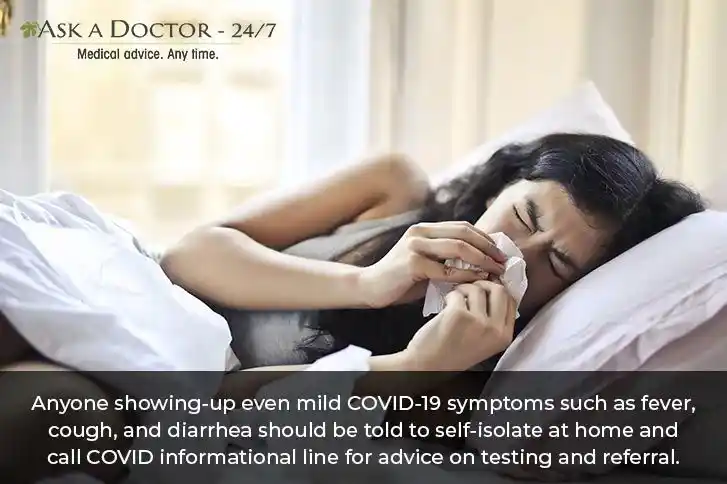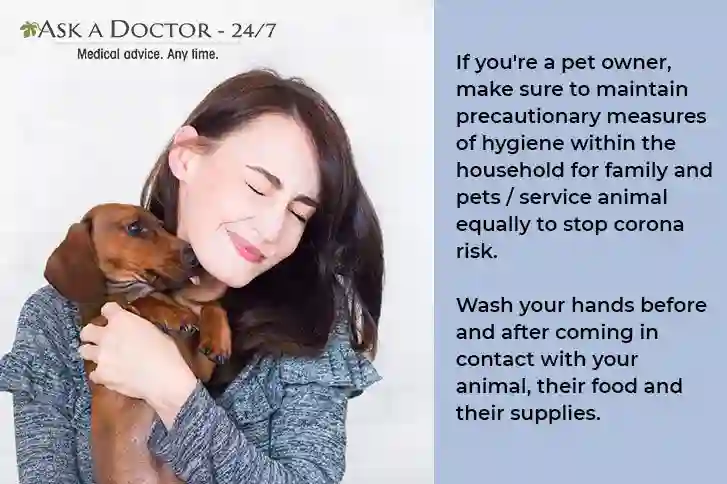Coronavirus-2019: Preventive Measures For Caregivers & Pets!
Absolutely! Daily habits of hygiene and cleanliness go a long way in protecting yourself and the people around you from COVID-19! Below are some useful preventive measures, which will help secure the safety of your loved ones, your neighborhood, and yourself.
Preventive measures for an individual

- Remain indoors and maintain personal hygiene.
- Wash hands with soap and water. Take a good 20 seconds to wash thoroughly. If not soap, use alcohol-based sanitizers, which contain at least 60% alcohol.
- Avoid touching your eyes, nose, and mouth with unclean hands.
- Do not touch your face followed by clothing or other surfaces. Do not wipe your hands on your clothing.
- Drink hot water. It helps in eliminating germs. Stay away from cold food items (E.g: ice creams, milk shakes, cold salads, etc.).
- Stock up on groceries and everyday necessities to avoid running errands unnecessarily.
- Wear a mask if you are unwell with cough, cold, or other respiratory symptoms. Dispose mask after 24-hour usage. Face masks are not required for healthy individuals.
- Use disposable tissue or towel while sneezing or coughing. Dispose them in the trash can immediately after use.
- Avoid coming in contact with sick people.
- After returning from work, shopping, or any errand, discard your clothes separately and wash your face, hands, and feet thoroughly.
- Wash used clothes separately. According to UNICEF, Corona virus can remain on clothing for up to 9 hours.
- Avoid touching frequently-used surfaces in public places, as much as possible.
- Avoid consuming raw or under-cooked meat and animal products.
Preventive measures for a caregiver
- Wear protective equipment like disposable gloves, disposable gowns, disposable N95 respirators, and eye protection as directed by CDC.
- Maintain cleanliness and hygiene of the patient.
- Keep their premises well sanitized.
- Minimize visitors.
- Use dedicated, disposable patient care equipment.
Precautions and preventive measures for pet and service animal owners

- Stock up on food, essential supplies, and medication for your pet / service animal while you do the same for your family and loved ones.
- Maintain precautionary measures of hygiene within the household for family and pets / service animal.
- Wash your hands before and after coming in contact with your animal, their food, and their supplies.
- Implement all other preventive measures as mentioned above for individual and household care.
If you are a caregiver and you get sick
- Avoid touching, petting, kissing, or playing with your pet as Corona virus may be able to survive on your pets' fur. Your pet may not get sick, but may transmit the virus from you to other caregivers.
- Wear a mask at all times, even around your pet / service animal.
- Avoid sharing plates, bowls, towels, beds, etc., with your pet.
- Keep an emergency kit for your pet ready, containing food and medication for at least 2 weeks, vaccines and medical prescriptions document, food, habits and preferences list along with veterinarian contact information.
- Proactively identify an emergency care giver who could help with short term or long term care.
Preventive measures for a clean home and a clean society
- Wash grocery items upon arrival from the shop (E.g: Milk bottles, oil cans, pouches, etc.).
- Wash all kitchen utensils well with soap and water before and after use. According to World Health Organization, COVID-19 may persist on surfaces anywhere between a few hours to several days.
- Wash food items thoroughly before storage and use.
- Request every visitor, guest, or help to wash their hands upon entering.
- Wipe clean the door bell and the entrance door handle everyday with a cleaning fluid.
- Clean and disinfect your homes especially frequently-used surfaces (E.g: Tables, chairs, health faucets, taps, curtains, window and door bolts, etc.).
- Clean remote controls, phones, and keyboards at least once in a day.
- Keep your homes well ventilated. Keep windows and doors open. Let there be air circulation between rooms and throughout the house.
- Put extra care everyday in disinfecting and cleaning the rooms of your children and your elderly loved ones.
- Do not order anything through courier or home delivery, and avoid it as much as possible.
- Consider cancelling the newspaper.
- Keep any courier received in a separate tray, untouched for at least 24 hours.
- Avoid public transportation.
- Avoid all public gatherings (E.g: Children's play areas, parties, celebrations, educative classes, workshops, summer camps, music / dance / prayer groups, etc.).
- Do not litter any kind of waste anywhere! Use trash cans and waste paper baskets wisely and appropriately.
- Do not spit in public places. Avoid chewing on pan and supari, so as to stop the need to spit.
- Avoid going on routine walks, especially senior citizens, as their immunity could get easily compromised.
- Wear a mask if you are unwell with cough, cold, or similar symptoms.
Corona virus spreads easily through COVID-19 infected individuals and through contact with contaminated surfaces. With the help of these preventive measures and its diligent practice, you can reduce the spread of this infection drastically.
If you are looking for more information on Corona virus, you can consult an Internal Medicine Specialist now.
Ask a Specialist
Recent Questions

